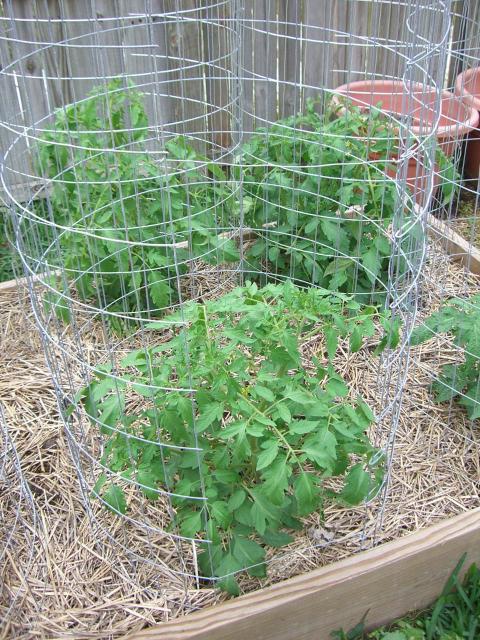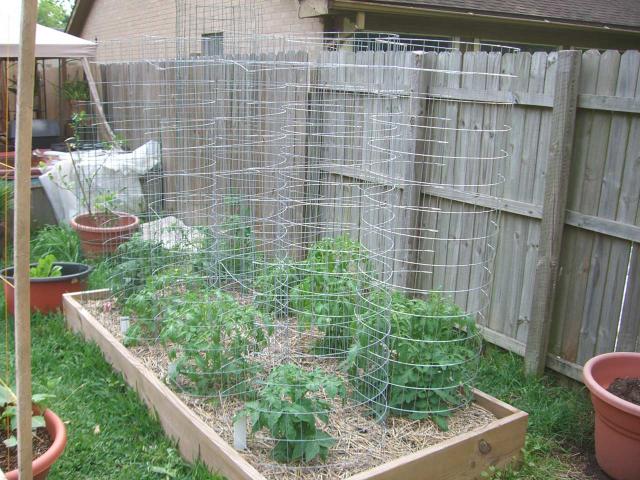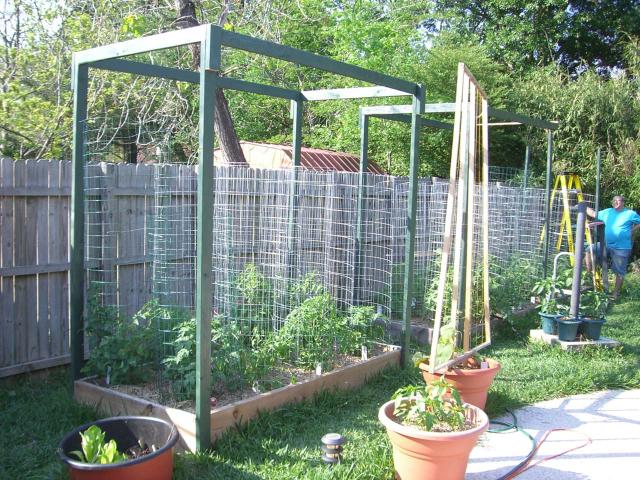

|
Have a great invention to help with gardening? Are you the self-reliant type that prefers Building It Yourself vs. buying it? Share and discuss your ideas and projects with other members.
|
 |
|
|
Thread Tools | Display Modes |
|
|
#1 |
|
Tomatovillian™
Join Date: Jul 2006
Location: Rockvale, TN Zone 7A
Posts: 526
|
I keep striving toward a system that will support huge tomato plants dependably. Maybe this year's effort will be the one. In the past I have tried the following:
Storebought 3 and 4 ring cages - My plants outgrow them by late May. They are useless except for very small varieties such as Stick or Patio. Nylon String Trellis - not a bad system but requires a lot of pruning which seems to increase susceptibility to disease. If you have really heavily loaded plants, some modification is required as well. Homemade stock fence cages - Without support they aren't sturdy enough. With 1 x 1 stakes like I used last year, they are okay until the plants get about 7 feet tall, then look out. I haven't tried simple staking since my plants usually get so bushy that I would have to spend a lot of time tying plants to stakes. Florida weave wouldn't be easy, either, since my plants are in a circle rather than a row. So, this is the plan for this year. I kept the homemade stock fence cages. Two stacked together are 7 feet tall. I acquired some surplus road sign posts (I work in road construction but you might be able to get these from contractors when they replace them or from your local traffic and parking commission). These posts average 10 feet tall but some are longer. I drive the stakes down in the ground as far as possible which with my setup is about 24 inches. Next, I weave the cages over the posts and push them in the ground. These seem very sturdy so far but only time will tell. I had one extra long post so I used it for Granny Cantrell's German Red, my 15 1/2' plant from last year. mater  
|
|
|

|
|
|
#2 |
|
Tomatovillian™
Join Date: Jan 2007
Location: PNW
Posts: 4,743
|
I had one stake like that last year, only it was
a 10' long branch pruned from a tree stuck 2' into the ground with cages on both sides of it and a plant on each side. It was just the right size for the Moskvich on one side, but the Manalucie on the other side came out the top and was trailing down by the middle of September. The cages were about half the diameter of yours, and every couple of weeks I would have to tuck branches growing out the sides back into it. I don't see any reason why what you have there wouldn't work.
__________________
-- alias |
|
|

|
|
|
#3 |
|
Tomatovillian™
Join Date: Feb 2006
Location: MS
Posts: 1,523
|
I can't find an easy way to do it. I use concrete reenforcing wire (CRW) that is made in 24" diameter. Looks big in May, small in July when the plants have filled it, then I wish it was 36"!
To me, it's a waste of time trying to stake the cages at the bottom. So, I drive a metal fence post, like you are doing. Sometimes I can put one on each end when I'm growing in the field, and run a strong wire down several cages and secure them that way. Since I'm doing the posts anyway, I thought about forgetting the cages, but once the plants get big it's just too difficult trying to tie the plants if you have very many. You soon find yourself needing to check them for tying every couple of days. With the cages they stay fairly manageable without all the tying. Even with cages I can't keep them in good order once the season gets later on. The plants are just too big by then, and sprawling everywhere. I have yet to see a store bought cage that works well with larger plants. You have a nice looking set-up! Good luck! Don
__________________
Zone 7B, N. MS |
|
|

|
|
|
#4 |
|
Tomatovillian™
Join Date: May 2006
Location: Rock Hill, SC
Posts: 5,346
|
Galvanized 5' metal fencing in a 100 foot roll.
Make a cage and leave 10" open in the front. Use metal wire to attach the open ends of the cage.  Using more metal wire, I attached the cages to each other using simple twists of metal so they won't go anywhere. Also used a staple gun to staple the bottoms of the cages to the sides of the bed.  Click for Larger Size Finally erected a wooden framework over the beds so when the torrential rains come in June, instead of a garden full of split tomatoes, I'll be able to keep some of the rain out.  Gotta love the cucumber trellis that has warped due to the tightness of the trellising twine. 
|
|
|

|
|
|
#5 | |
|
Tomatovillian™
Join Date: Jun 2006
Location: NY
Posts: 2,618
|
Quote:
 But serious, great looking setup aesthetically speaking! :cool: dcarch
__________________
tomatomatomatomatomatomatomatomatomatomatomatomato matomato tomatomatomatomatomatomatomatomatomatomatomatomato matomato tomatomatomatomatomatomatomatomatomatomatomatomato matomato |
|
|
|

|
|
|
#6 |
|
Tomatovillian™
Join Date: Jul 2006
Location: Rockvale, TN Zone 7A
Posts: 526
|
My wife seems to like it so it makes me happy. I still haven't figured out what kind of blocks those are. They were on the property when we bought it. (At the other end unfortunately, argh) I did a little measuring then hauled them down the hill. Anyone ever seen any like them before?
mater |
|
|

|
|
|
#7 |
|
Tomatovillian™
Join Date: Feb 2006
Location: Den of Drunken Fools
Posts: 38,539
|
No I haven't now that you mention it.
They ARE strange!!!! Worth |
|
|

|
|
|
#8 |
|
Tomatovillian™
Join Date: Feb 2006
Location: MO z6a near St. Louis
Posts: 1,349
|
The blocks are cool. Be glad the previous owners shelled out the $$$ for them and not you--they probably cost a small fortune apiece.
__________________
--Ruth Some say the glass half-full. Others say the glass is half-empty. To an engineer, it’s twice as big as it needs to be. |
|
|

|
|
|
#9 |
|
Tomatovillian™
Join Date: Mar 2007
Location: alabama
Posts: 1
|
Those are modular retaining wall blocks sometimes called keystone (that is a brand name) They are used in con★★★★★★★★ with gravel backfill and a netting reinforcement to construct retaining walls, some of which can be quite high with proper engineering. You got a good score there. They can be pretty pricy.
|
|
|

|
|
|
#10 |
|
Tomatovillian™
Join Date: May 2007
Location: Pacific Palisades, CA
Posts: 14
|
I have had this problem ever since I started growing tomatoes many years ago. This year, I happened to get into an email conversation with a commercial grower in San Diego and he sent me a drawing which I am following. Don't quite know how its goung to work out because it defies a lot of the knowledge that I have gathered over the years. It consists of setting up two 2" stakes at either end of a row of plants and running flexible galvanized wire on one side and twine on the other starting just ynder the first flowers. You put smaller stakes between each plant and tie the twine to the wire at each stake. I can send a drawing if anyone is interested. From my point of view it doesn't allow for the plants to spread at the top, but he claims they don't have to. It creates a very strong framework and supports the fruit, he says, perfectly. We'll see. When I visited Dr. Carolyn, who some of you may know of, she was growing her tomatoes without ANY staking. Just trailed on the ground. And she wrote the book.
Dennis |
|
|

|
|
|
#11 |
|
Tomatovillian™
Join Date: Feb 2006
Location: MS
Posts: 1,523
|
She calls it the sprawl method, and it works well in some places, not so well in others, as I understand it. There has been discussion about it here in other threads. I think in the warmer climates it can lead to problems with bugs and disease. Up north, and in windy climes, I think it does pretty good. You may can try a search for Sprawling, or the Sprawl Method.
But to cages, staking, etc., a guy named Charles Wilber over in Alabama has a really fun tomato book called How To Grow World Record Tomatoes, and his caging is amazing. He has to get on scaffolding to reach the top of some plants! Seems one grew nearly 30 feet tall. His plants and their production is virtually unbelievable. If you don't have the book it might interest you to see how he uses cages and stakes...and scaffolding! He has HUGE plants. The pictures are great...and makes seeing believing. You have a good looking set-up. If you seek height, you might can sleeve over your metal posts with a larger diameter metal or PVC pipe the height you need. Or strap a 12-16 foot 4X4 to it with large hose clamps. Just an idea. Don
__________________
Zone 7B, N. MS |
|
|

|
|
|
#12 | |
|
Tomatovillian™
Join Date: May 2007
Location: Woodstock GA
Posts: 418
|
Quote:

|
|
|
|

|
|
|
#13 |
|
Tomatovillian™
Join Date: Feb 2006
Location: Den of Drunken Fools
Posts: 38,539
|
I wouldn’t give up on the system yet what you need to do is not put the branches in between very tight cord.
If you look at my cheapo tomato tie up thread you might be able to see that I weave the vines between alternating lines. I also tie up branches from the taller lines and let them hang from individual lines, this way the plants have room to grow and move around and not get sawed in half. Remember the plants will grow so don’t choke of the vines by making the lines too tight around the vines.  The plant need to be about 3 feet apart or more for this system to truly show its benefits.  Worth |
|
|

|
|
|
#14 |
|
Tomatovillian™
Join Date: May 2007
Location: Pacific Palisades, CA
Posts: 14
|
Thanks for the reply. When I read the post about canes being sawed off I contacted the grower who told me about this system and he indeed said that other than the very bottom wire and string, the ones that start moving up the plant as it grows should be strung loose, thereby allowing the plant to spread a little at the top and tro breathe. I'll go take a look at your other post.
Dennis |
|
|

|
|
|
#15 |
|
Tomatovillian™
Join Date: May 2007
Location: Pacific Palisades, CA
Posts: 14
|
Can't find the "cheapo tie up thread" Can you direct me?
Dennis |
|
|

|
 |
|
|
